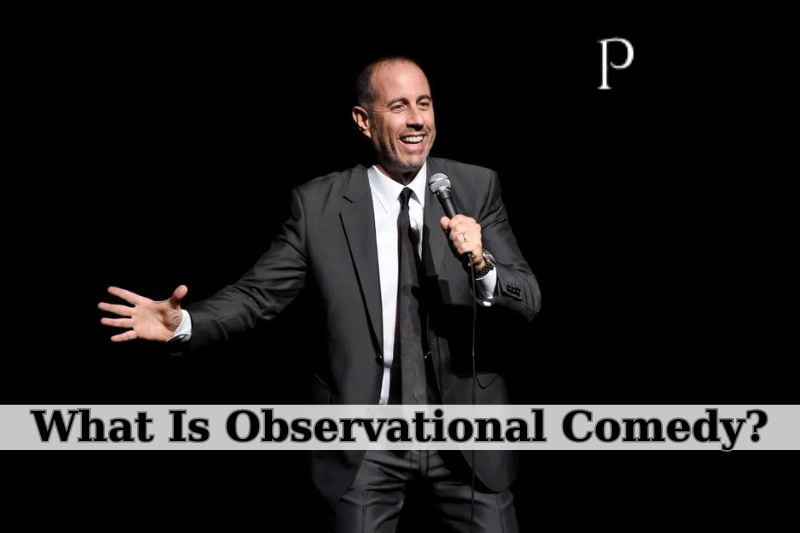Hey there, ever wondered what is observational comedy? Well, get ready for a wild ride through the wacky world of everyday humor.
From mundane moments to belly-aching laughter, Rachelparris is about to unravel the secrets behind this timeless comedic style that keeps us all chuckling.
Contents
What is The Definition of Observational Comedy?

Observational comedy is a unique form of humor that focuses on the commonplace aspects of everyday life. It is one of the main types of humor in stand-up comedy.
In an observational comedy act, the comedian makes an observation about something which is common enough to be familiar to their audience, but not commonly discussed.
These observations are often presented with phrases like Have you ever noticed…? or Did you ever notice…? which have become comedy clichés.
Observational Comedy Overview
The Essence of Observational Comedy
Observational comedy is like that friend who points out the elephant in the room but in a way that has everyone in stitches.
It’s a genre of comedy that mines humor from the day-to-day experiences we all share, but often overlook. It’s the art of taking the ordinary and turning it into extraordinary laughter.
Type of Observational Comedy
Observational comedy is a staple in the world of stand-up. But it’s not just about cracking jokes; it’s about storytelling and taking the audience on a journey through the familiar landscapes of their daily lives. It’s about making the mundane, magnificent.
Elements
The elements that make up observational comedy include personal narrative, noticing everyday phenomena, and offering a different perspective on human nature.
The humor essentially involves looking at the inner workings of everybody’s brains or tackling topics that everyone has been forced to consider at some point.
Observational comedy relies heavily on language, ranging from vernacular speech to puns and wordplay. It also uses taboo subjects and incongruence and juxtaposition for comedic effect. Sometimes, it may rely on physical and crude humor, known as low comedy.

Features
Language Play
A play on words, clever puns, and everyday lingo are the tools of the trade in observational comedy. The humor often lies in the delivery and the twist on commonly used phrases.
Commonplace Quirks
Observational comedians are like detectives of the mundane. They notice the little things we all experience but seldom discuss, from the frustrations of technology to the oddities of social interactions.
Unfiltered Perspectives
Often, observational humor provides a raw and unfiltered look at life. It can dive into taboo subjects or present an incongruent juxtaposition that’s both surprising and hilarious.
Physical Comedy
Sometimes, it’s not just about the words. Physical antics and exaggerated expressions can amplify the humor in the everyday.
Read More: What is Physical Comedy: Meaning, Types, Feature. All You Need To Know
Examples
Jerry Seinfeld: The king of observational comedy, Seinfeld’s routines are a seamless stream of musings on everyday life, from the perplexities of laundry to the oddities of social greetings.
George Carlin: With a sharp wit and a fearless approach to controversial topics, Carlin’s observational comedy often held a mirror up to society, prompting both laughter and reflection.
James Acaster: Representing the new wave of observational comedians, Acaster’s uber-trivial style puts a magnifying glass on the most minute and absurd aspects of daily life.
FAQs about Observational Comedy

How does Observational Comedy work?
Observational comedy works by highlighting universally familiar situations or behaviors that may not have been consciously noted by the audience.
The comedian presents these observations in a humorous light, often using phrases like Have you ever noticed…? or Did you ever notice…? Who are some famous Observational Comedians?
When did Observational Comedy become popular?
Observational comedy became popular in the United States in the 1950s, with pioneers like Shelley Berman leading the way. However, it can be argued that even much older jokes commented on human nature in comparable ways.
How does Observational Comedy contribute to society?
By shining a humorous light on subjects like politics, religion, gender, and race, observational comedians provoke thought, encourage dialogue, and challenge societal norms.
They also play a role in diffusing tension and promoting mental health through laughter.
What is the role of language in Observational Comedy?
Language plays a crucial role in observational comedy. Comedians use vernacular speech, puns, and wordplay to enhance their observations and make them more humorous and engaging.
Can Observational Comedy be controversial?
Yes, observational comedy can sometimes be controversial as it often tackles taboo subjects and societal norms. Comedians like Dave Chappelle and Ricky Gervais are known for their bold comedic style that frequently targets taboo subjects and challenges societal norms.
Conclusion
There you have it, folks! Observational comedy, the art of finding the funny in the everyday grind, continues to tickle our funny bones and bring us closer through shared laughter.
So next time you notice the absurdities of daily life, remember, you might just have stumbled upon some hilarious observational comedy gold! Keep laughing and keep life light! Thank you for reading.
Intrigued by the diversity of comedy? Let’s explore what the list below offers.

